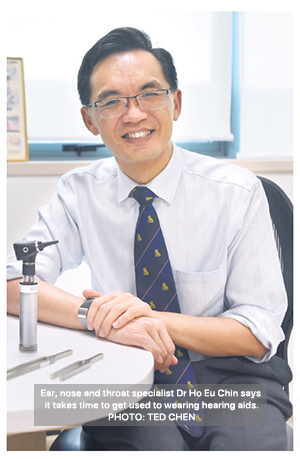The Sunday Times (19 January 2020)
Managing hearing loss early can contribute to improved relationships and better quality of life

The first sign of hearing loss is when your family members or friends start to question if your hearing is okay. Dr Ho Eu Chin, a senior consultant at the Department of Otorhinolaryngology at Tan Tock Seng.
Hospital, gives another example: “When other people laugh and you don’t hear them, it’s probably time to get your hearing checked.” The ear, nose and throat specialist says that hearing loss is an invisible disability and because of that, many people do not see the need to treat it.
There is also the misconception that hearing aids do not work. Dr Ho has seen many patients who stopped using hearing aids after a few tries because they found that the devices did not meet their expectations.
He encourages his patients to continue using the hearing aids despite the initial “loudness discomfort” as it typically takes at least six months to get used to them. The payo� can be rewarding — he has seen an improvement in some patients’ relationships with their families after they got used to hearing aids.
Getting used to hearing aids
By the time patients are referred to Dr Ho, they are usually su� ering from hearing loss that is bad enough to cause disability.
This is why it is important for everyone, especially seniors aged 60 and above, to go for regular health screenings. Project Silver Screen, which is a collaboration between Ministry of Health and Temasek Foundation, is a screening programme that targets this group. These screenings are held at residents’ committee centres, and community centres and clubs around the island to ensure the seniors’ eyes, ears and mouth are in good health.
While most types of hearing loss are not reversible, they can be managed by using hearing aids.
Dr Ho explains that hearing is a sophisticated function of the body. The hearing process involves many parts of the ear working together to convert sound waves into electrical signals the brain understands and interprets as sounds.
Patients should give themselves time to get used to the hearing aids, and allow the brain to relearn what sounds to focus on as “speech” and what sounds to fi lter out as “background noise”, he adds.
“Hearing loss is gradual so over the years the brain forgets what background noise is,” he says. “Most severe hearing loss would have happened over a long period of time — for instance 30 years — so it will take six months or more to treat it.”
Studies have shown that hearing loss is linked to dementia and is in fact the most important modifi able risk factor for dementia, he says.
One theory linking hearing loss to dementia is that the biological processes that cause hearing loss — such as the narrowing of the arteries and compromised blood supply to the organs — can also cause dementia.
Another theory is that the additional concentration needed to understand what others are saying can lead to mental fatigue that compromises other cognitive functions.
“Studies have shown that dementia is less likely if you have an active social life. Those with untreated hearing loss tend to withdraw from social activities due to communication di� culties,” Dr Ho says.
Risk factors
According to a study done by Singapore’s Ministry of Health in 2010, almost 10 per cent of Singaporeans in their 60s su� er from disabling hearing loss, which means they have di� culty hearing conversations in a crowded co� ee shop or during a family dinner when several people are speaking.
Apart from old age, other factors that contribute to hearing loss include exposure to loud noises for a prolonged period of time, metabolic diseases like Type 2 diabetes, high blood pressure and high cholesterol levels.
These diseases contribute to the narrowing of the arteries. Just like how the narrowing of arteries can lead to heart attacks and strokes, this can limit the supply of blood to the cochlear, which is the part of the ear that translates sounds into nerve impulses to send to the brain.
“If you already have one of the three diseases, then your risk is much increased,” says Dr Ho. “You should get your hearing checked as soon as possible.”
ABOUT PROJECT SILVER SCREEN (PSS)
WHAT:
- A nationwide functional screening programme for seniors aged 60 and above. It is a three-in-one screening to check your eyes, ears and mouth held at various community centres and clubs, and residents’ committee centres across the island.
HOW MUCH:
- Free for Pioneer Generation card holders; $2 for Merdeka Generation card holders and Community Health Assist Scheme (CHAS) Orange and Blue card holders; and $5 for CHAS Green card holders and other eligible Singapore Citizens.
WHERE AND WHEN:
- For more information on the functional screening schedule and their locations, visit www.projectsilverscreen.sg or call the AIC hotline at 1800-650-6060 (Monday to Friday: 8.30am to 8.30pm, and Saturday: 8.30am to 4pm, excluding public holidays).